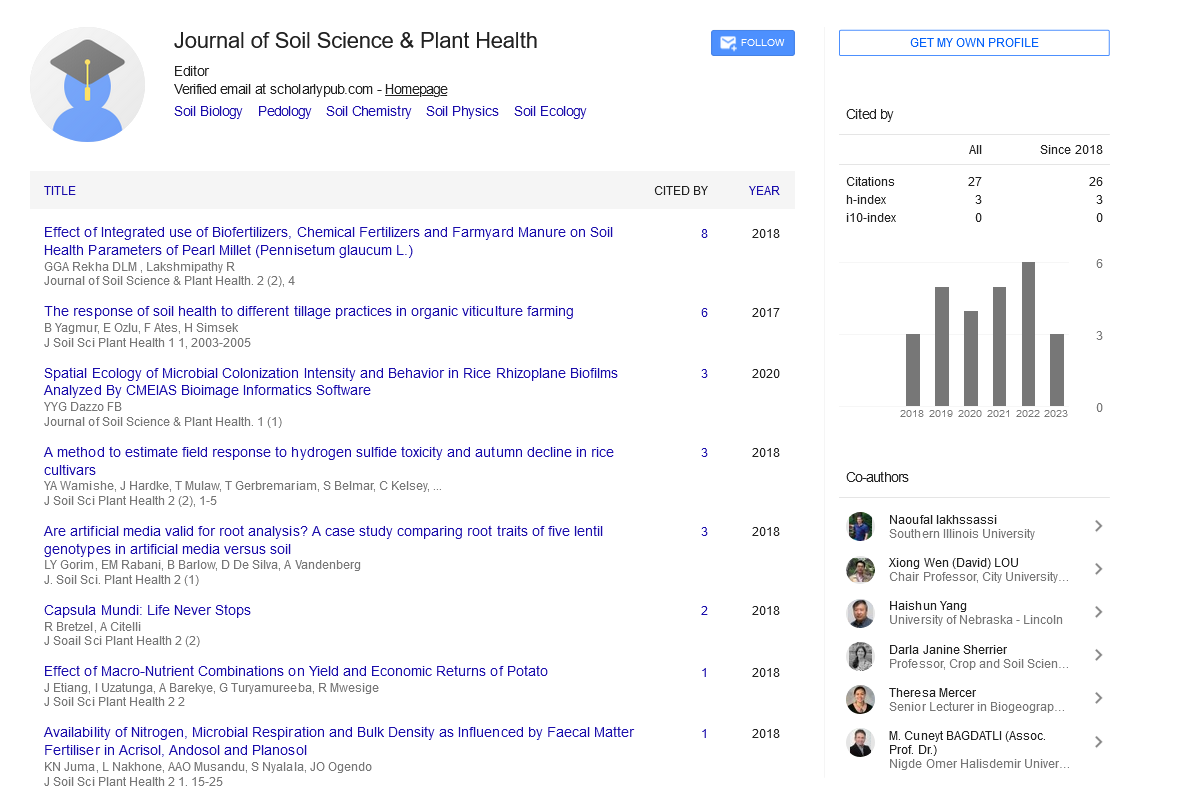Opinion Article, Vol: 7 Issue: 4
Soil Pollution and Its Implications for Food Safety in Agriculture
Shaheen Hamada*
1Department of Microbial Ecology, Centre for Microbiology and Environmental Systems Science, University of Vienna, Vienna, Austria
*Corresponding Author: Shaheen Hamada,
Department of Microbial Ecology,
Centre for Microbiology and Environmental Systems Science, University of Vienna,
Vienna, Austria
E-mail: shaheen.hamada@univie.ac.at
Received date: 31 July, 2023, Manuscript No. JSPH-23-113270;
Editor assigned date: 02 August, 2023, PreQC No. JSPH-23-113270 (PQ);
Reviewed date: 16 August, 2023, QC No. JSPH-23-113270;
Revised date: 23 August, 2023, Manuscript No. JSPH-23-113270 (R);
Published date: 30 August, 2023, DOI:10.4172/jsph.1000208
Citation: Hamada S (2023) Soil Pollution and Its Implications for Food Safety in Agriculture. J Soil Sci Plant Nutr 7:4.
Description
Soil is a vital natural resource that plays a crucial role in supporting life on earth. It serves as the foundation for agriculture, providing essential nutrients and a medium for plant growth. However, the quality of soil is increasingly threatened by various pollutants, leading to soil pollution. Soil pollution is a widespread and alarming environmental problem with far-reaching consequences for food safety in agriculture. This essay explores the causes and consequences of soil pollution, highlighting its implications for the safety of the food we consume.
Causes of soil pollution
Soil pollution can be attributed to a multitude of sources, both natural and anthropogenic. Understanding the causes is essential to address this critical issue effectively.
Industrial activities: One of the primary sources of soil pollution is industrial activities. Factories often discharge toxic chemicals and heavy metals into the environment, contaminating the soil. These pollutants can persist in the soil for years, posing a significant threat to food safety.
Agricultural practices: While agriculture is essential for food production, certain farming practices contribute to soil pollution. The excessive use of chemical fertilizers, pesticides, and herbicides can result in the accumulation of harmful substances in the soil.
Waste disposal: Improper disposal of solid and hazardous waste materials can lead to soil contamination. Landfills and waste dumps can release harmful compounds that infiltrate the soil, endangering the health of the food chain.
Mining activities: Mining operations often involve the extraction of minerals and metals from the earth. These activities can release heavy metals and other toxic substances into the soil, contaminating large areas of land.
Urbanization: The expansion of urban areas can result in soil pollution due to the construction and development of infrastructure. Urban runoff, which carries pollutants from roads and buildings, can find its way into the soil.
Implications for food safetySoil pollution has significant implications for food safety in agriculture. The contamination of soil with various pollutants can affect crops and, consequently, the food we consume. Here are some of the key implications:
Crop contamination: Soil pollution can lead to the uptake of contaminants by crops. Plants absorb nutrients and water through their roots, making them vulnerable to pollutants present in the soil. This can result in crops containing harmful substances such as heavy metals, pesticides, and organic pollutants.
Health risks: When contaminated crops are consumed, they pose a direct risk to human health. Heavy metals like lead, cadmium, and mercury, when ingested through contaminated food, can lead to various health issues, including organ damage, neurological problems, and cancer.
Bioaccumulation: Soil pollution can lead to the bioaccumulation of pollutants in the food chain. For example, if livestock graze on polluted pasture, the contaminants can accumulate in their tissues. When humans consume animal products, they may unknowingly ingest these pollutants at higher concentrations.
Food security: Soil pollution can undermine food security by reducing crop yields and quality. Contaminated soil may lead to stunted plant growth, decreased agricultural productivity, and, in extreme cases, crop failure. This can impact the availability and affordability of food.
Soil pollution poses significant threats to food safety in agriculture. It is a complex and multifaceted issue driven by industrial activities, agricultural practices, waste disposal, urbanization, and mining. The implications of soil pollution range from crop contamination to health risks and economic costs. To address this critical problem, governments, farmers, and society as a whole must take proactive steps to mitigate and prevent soil pollution. Protecting the quality of our soil is not only essential for food safety but also for the long-term sustainability of agriculture and the well-being of future generations.
 Spanish
Spanish  Chinese
Chinese  Russian
Russian  German
German  French
French  Japanese
Japanese  Portuguese
Portuguese  Hindi
Hindi 